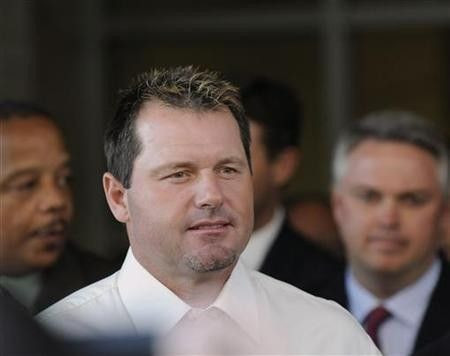Roger Clemens Trial: Andy Petitte Smoking Gun
Column: Andy Petitte Reason Roger Clemens Will be Found Guilty

Andy Petitte is the smoking gun.
He's the reason Roger Clemens is going down in his federal criminal trial on six counts, scheduled to begin Wednesday in Washington.
Prosecutors say Clemens, a seven-time Cy Young Award winning retired Major League Baseball pitcher, obstructed the U.S. Congress, made false statements to Congress, and committed perjury before Congress when he testified in February 2008 before the House Committee on Oversight and Government Reform about performance enhancing drugs.
Clemens told Congress, among other things, that he never used performance-enhancing drugs when he was arguably the most dominant pitcher in all of professional baseball.
America's game has revealed, however, through confessionals, mostly forced, that it was littered beginning in the 1990s with players using performance-enhancing drugs and Clemens fit the classic profile -- aging, once-great player who found new legs and game dominance with sudden strength and vigor attributed to diet and workout regimen.
Clemens was getting older, but his fastball was getting 1- MPH faster.
Never mind how that defies human logic, if not possibility. Never mind that Clemens still seems to think we all don't know.
It doesn't matter, though, how staunchly he argues in defense, since no matter what Clemens tries to claim, he's not Casey Anthony who got away with murder.
She got off because there was no smoking gun. That's how O.J. Simpson got off, too.
Remember that glove that didn't fit?
In the case of Clemens, the glove fits, and he's going to have to wear it when the trial ends in four to five weeks.
The glove, or the smoking gun, in Clemens' trial is Petitte, his former close friend and former teammate with the New York Yankees. Also a pitcher, Petitte is the key element of Clemens' trial, about to become famous since it begins just as America's most recent legal soap opera, the Casey Anthony trial, goes off the air.
Some experts argue Clemens' legal fate is a 50-50 toss up. Evidence weighs heavily against him, but as long as he's in denial and without something like actual pictures of him taking performance-enhancing drugs while he was a professional baseball player, he's got a good chance of getting off, some say.
Petitte's testimony will take care of that, though. Despite the fact that Clemens has said Petitte misremembers a conversation between the one-time friends in which Clemens reportedly told Petitte that he had received injections of HGH, a performance-enhancing hormone, while he was a player, that's the one likely to take him down.
Petitte has no reason to lie and subject himself to perjury as a witness in the trial, just as he had no reason to ruin their friendship and risk perjury in 2008. Yet that's when, in an affidavit made public as part of a hearing before the U.S. House of Representatives committee on the issue of performance-enhancing drugs in baseball, Petitte said he had used HGH, and he recalled being told by Clemens, his close friend, that he had used performance enhancing drugs.
Clemens' only defense on that one is that Petitte is confused.
But Clemens is the one who seems confused. He seems confused that he's caught, and that he would be best served to just come clean, and cut a deal with the truth. Say he did it and say that Petitte is not mistaken.
Otherwise, he'll just be guilty and a liar -- since Petitte has no reason to lie about something so important.
He's the smoking gun in Clemens' trial, and the reason Clemens will become by the end of the trial the one-time pitcher formerly known as one of the greatest to ever play the game.
© Copyright IBTimes 2025. All rights reserved.





















